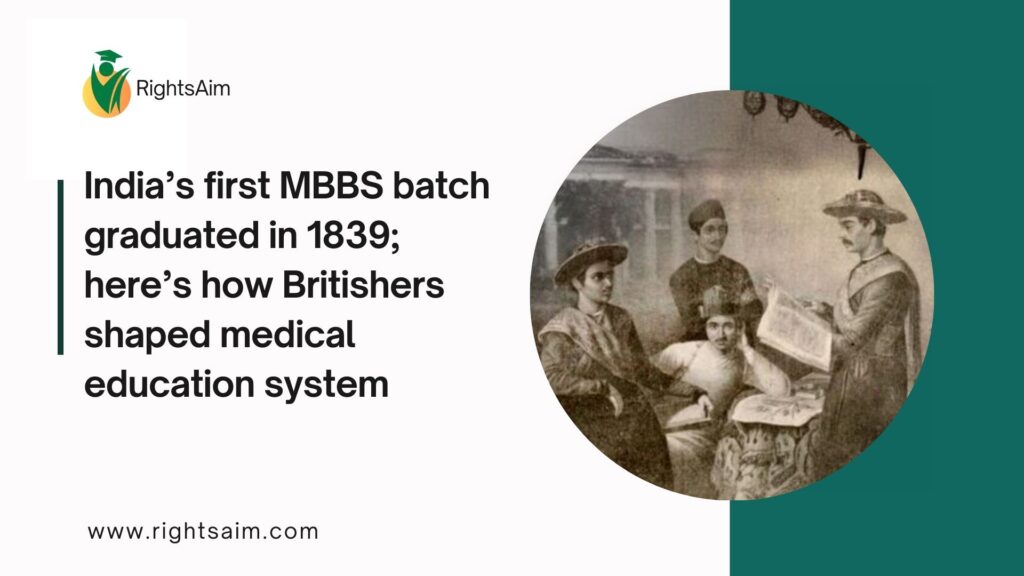
Table of Contents
2. The First MBBS Batch in India – 1839
The first MBBS (Bachelor of Medicine, Bachelor of Surgery) graduates in India completed their studies in 1839.
These students were trained under the British East India Company’s medical system, which aimed to produce physicians capable of serving both colonial administration and the general population.
The Calcutta Medical College, established in 1835, was the first institution to offer formal western medical education in India.
This marked a turning point in Indian medical history, transitioning from traditional medicine to a structured curriculum based on modern science.
British Influence on Medical Education in India
The British played a significant role in shaping India’s medical system:
Introduction of Western Medicine: The British introduced anatomy, physiology, surgery, and pharmacology in structured curricula.
Standardized Medical Training: They implemented formal exams, clinical training, and degrees similar to British universities.
Medical Services for the Colonial Government: Doctors trained in these programs served hospitals, military, and civil administration.
Regulatory Bodies: British authorities laid the foundation for institutions that later became Medical Council of India (MCI), regulating medical education.
Establishment of Medical Colleges
Some of the earliest British-established medical colleges in India include:
| College | Year Established | Location | Significance |
|---|---|---|---|
| Calcutta Medical College | 1835 | Kolkata | First modern medical college in India |
| Madras Medical College | 1835 | Chennai | Early training center for physicians in South India |
| Grant Medical College | 1845 | Mumbai | Western medical education for western India |
These colleges formed the backbone of modern medical education in India, producing generations of trained doctors.
5. Curriculum and Training Methods
The British-era medical curriculum emphasized:
Anatomy & Physiology: Cadaver dissection and lab-based learning.
Surgery & Medicine: Clinical exposure in hospitals.
Pharmacology & Pathology: Systematic understanding of diseases and treatments.
Professional Ethics: Discipline and responsibility in patient care.
This structured training ensured that graduates were well-prepared to serve public health and colonial administration.
6. Key Figures and Pioneers
Dr. John Anderson: First principal of Calcutta Medical College.
Dr. William Brooke O’Shaughnessy: Introduced modern pharmacology and therapeutics.
Indian Pioneers: Early graduates who became founders of hospitals and medical societies in India.
These individuals played a critical role in shaping India’s medical education and healthcare system.
7. Impact on Modern Indian Medicine
Foundation of Western Medical Practices: Modern hospitals, diagnostics, and clinical training.
Medical Research: Initiated structured research in microbiology, surgery, and pharmacology.
Professional Recognition: Standardized degrees (MBBS) recognized globally.
Public Health Systems: British-trained doctors contributed to vaccination drives, sanitation, and epidemic control.
8. Evolution of MBBS in India
From 1839, MBBS education evolved with new colleges, updated curriculum, and postgraduate programs.
Indian Medical Council Act, 1933 and later National Medical Commission (NMC) regulated quality education.
Today, India has over 600 medical colleges producing thousands of doctors annually.
Modern MBBS combines clinical practice, research, and community medicine, retaining elements introduced by the British.
Summary Table
| Topic | Key Points |
|---|---|
| First MBBS Batch | 1839 |
| First Medical College | Calcutta Medical College, 1835 |
| British Influence | Western medicine, structured curriculum, exams, ethics |
| Early Colleges | Madras, Grant Medical College |
| Impact | Foundation of modern Indian healthcare and medical research |
FAQs
Calcutta Medical College, established in 1835.
By introducing western medicine, structured curriculum, standardized exams, and professional ethics.
From 1839, MBBS education evolved with new colleges, postgraduate programs, research, and community medicine, regulated by NMC today.


